A few weeks ago I was in class with my students here in Quito when the building began to sway. We knew immediately what was happening. My room is on the third floor of a new building supposedly built to “earthquake standards,” as are all new buildings in Quito. In theory this affords a measure of confidence, but there is nothing like a little wiggle in the earth’s crust to focus the attention.
My students and I looked at each other and grinned uneasily as the landscape outside moved. We hardly knew what to do as it happened so suddenly, and so we sat as the building swayed, hoping things would not get worse.
After about ten seconds it stopped. We breathed a collective sigh of relief and laughed nervously. However, as leader of this particular small group, I had some calculations to make. This was really not a laughing matter. I went into the hall, where some other teachers and a smattering of students were milling outside their classrooms in a state of anxious uncertainty. I conferred with the teachers and we decided that if the earth should start moving again we would waste no time in removing our students to the plaza outside, safely away from the building.
Five minutes later the building began moving. I had already told my students that we would evacuate immediately (stairs, not elevators!) in the event of another tremor. Better safe than sorry was the activating principle of the moment, a sort of seismic take on Pascal’s Wager: if one is faced with a choice between doing or not doing, and the possible consequence of not doing is catastrophic, and the only possible consequence of doing is non-catastrophic, then by all means, do. Of course Pascal was talking about belief in God; we are talking about staying in a building during an earthquake. Going outside to the plaza was not an absolute guarantee that something equally dire might not occur. We might have been struck by a meteorite, or attacked by crazed pigeons, but under the circumstances the odds seemed pretty good.
Nowadays a variation of this protective logic is referred to as the precautionary principle. As a species we are faced with any number of choices involving doing or not doing, the consequences of which concern our very survival. We are in large measure driven by instinct, but we can also choose. We have more than a modicum of free will. We have the ability, however difficult the task, to step outside subjectivity, instinct, and fear to appraise a situation dispassionately. It is this consciousness that is our only hope for survival. If we have been at least somewhat directing ourselves by conscious choice, then we can begin trying to re-direct ourselves as well.
We are a teaching species. We go to school to learn from teachers. To learn a skill we go to a specialist. Most of us have the capacity to learn from our mistakes. We teach ourselves, but primarily we learn from others, our parents, our schools, and the society into which we are born. A society and its values is the matrix from which all teaching flows. The formation of a society’s values is an evolutionary process, initiated by historical antecedents.
In the case of the United States it is fairly easy to establish a fixed moment when the dominant values of the present society began their evolving journey, that is, from the time Europeans first set foot on the continent, beginning with Columbus. The quest was for riches above all else. It was about plunder, and it was racist. It was exterminationist. Native Americans were viewed as subhuman, an impediment to expansion. They were slaughtered wholesale and forced to live on reservations. Africans, also regarded as sub-human, were forcibly employed as slaves to serve as the basis of the Southern economy, from which the North also profited. While there is merit in the founding documents and nominal guiding principles, though originally written for the benefit of the white, male, propertied class, the essence of the country grew from the seeds of two moral abominations, genocide and slavery. Added to this was the driving energy of a hyper-mercantilist ethos and technological skill, in an apparently limitless frontier, augmented by a Protestant, bible-thumping righteousness. In this new world those white Europeans who clawed their way to the top, flourished.
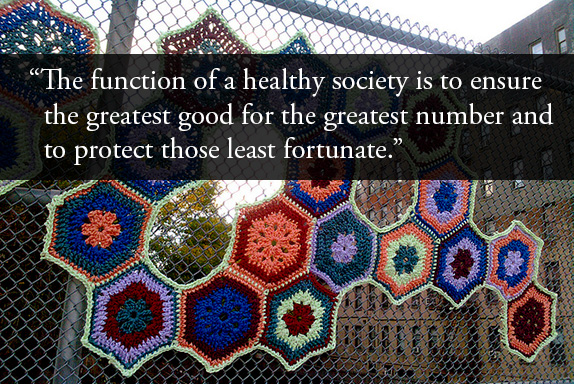
This is the soil from which our present harvest grows, and like the literal soil that has been poisoned by industrial farming, monoculture, chemicals and now widespread genetic engineering, our enterprise at large has become destructive to the general welfare.
Industrial agriculture is only one facet of the corporate behemoth that devours the world. Every aspect of our lives is controlled by giant corporations, food, energy, transportation, communication, entertainment, health care, such that it is almost impossible to imagine an alternative reality, much less function in a world without bowing to the demands of this all-dominant power.
And what is the core motivation of this power? The enrichment of individual and community life? The preservation of the environment? A quest for peace and understanding among nations? A search for spiritual fulfillment? A mission to ensure that all people partake of the world’s bounty? Certainly corporations endeavor mightily to communicate these nurturing sentiments, spending 171 billion dollars every year and employing a legion of highly paid creative talent to convince us, everywhere we go, everywhere we look, everywhere we listen, so that their message is in our dreams and in the dreams of our children.
The function of a healthy society is to ensure the greatest good for the greatest number and to protect those least fortunate. Corporations are our society’s greatest power. One would expect such a power to be an active participant in the flourishing of the general good, but, in fact, our society and world are not flourishing. The United States, epicenter of this corporate power, has 5% of the world’s population yet incarcerates 25% of the world’s prisoners, with the largest number of people behind bars in the world at two-and-a-quarter million, 60% of whom are of color. Another four-and-a-half million are either on parole or probation. The cost of this prison-industrial complex to the US taxpayer is 74 billion dollars a year, part of this money going to private, for-profit prison corporations, which make money from societal dysfunction. For-profit prisons have an occupancy clause in their contracts that mandates a minimum percentage of prison space to be filled, even if, as in the case of Colorado, the crime rate has decreased. Arizona, Louisiana, Oklahoma and Virginia are legally required to have between 95% and 100% occupancy in their private prisons.
Despite putative gains for African Americans, the income gap between black and white in the United States is 40% greater today than it was in 1967. Though there have been recent improvements due to legalized gambling and some developing industry, the poverty rate for Native Americans is 25%. 27.4% of blacks and 26.6% of Hispanics are poor. The rate for non-Hispanic whites is 9.9%. The gap between rich and poor in the US is the greatest in the industrialized world and comparable to Depression-era levels. The top 1% controls 42% of the nation’s wealth, the greatest concentration in the hands of the top .01%. The average CEO in the US makes 354 times more money than the average worker, by far the biggest disparity in the world. The unofficial unemployment rate (including those who have given up looking for work) is around 20%.
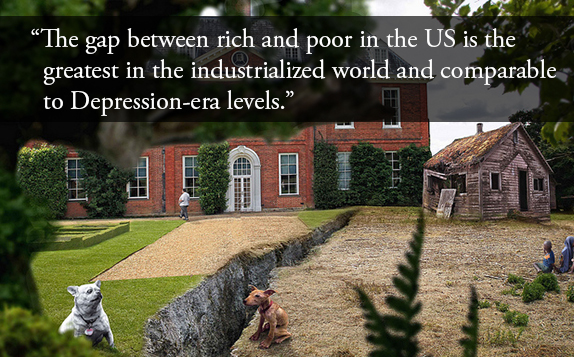
US citizens hold 800 billion dollars in credit card debt, much of it due to medical expenses. Despite the so-called Affordable Care Act, medical debt is responsible for 60% of bankruptcy cases in the US. The US spends more money than any country in the world on health care but ranks 37th, behind Costa Rica, whose public health insurance system is available nation-wide to all legal residents and citizens. Among 11 western industrialized nations examined in a recent study by the Commonwealth Fund, the United States ranks last in the quality of health care. Even with the Affordable Care Act there are 42 million people in the US without health insurance. 48,000 people in the US die every year because of this lack. Of course for the rich in the United States the quality of health care is first rate and eminently affordable.
Compared with the 171 billion dollars corporations spend on advertising, the US Department of Education budgets 141 billion dollars annually on public schools, with cash-strapped state and local governments struggling to pick up the rest of the cost. School closings are commonplace, especially in poor urban areas. The cost of higher education has grown dramatically over the last 30 years, making a college degree now all but prohibitive except for the children of the rich. 37 million young people in the US have stunted futures as a result of a 1.2 trillion dollar student debt burden, most of it non-forgivable. Society (the corporate state) has reneged on its part of the bargain to provide decent, well-paying jobs that would enable students to repay these debts.
Since the 1970s there has been a concerted effort on the part of the federal government, Democrat and Republican administrations alike, to deregulate the banking industry, finally accomplishing the mission with obscene profits for the speculators and the Great Recession of 2008 for everybody else. At the same time, corporate executives, concerned only with maximizing returns, have been closing factories and shipping domestic jobs overseas to the enormous cheap labor pool in developing countries, with glib admonitions for suddenly unemployed workers to “take advantage” of their devastation and “retrain,” citing tremendous opportunities in the “new economy,” opportunities that have never materialized.
The people responsible for this social catastrophe, the criminal bankers, CEOs, and their political handmaidens, remain free and richer than ever, enjoying the good life. The stock market booms while ordinary people suffer. The current economic system resembles a game of keep away, where financial giants toss around a ball of wealth beyond the reach of most. Indeed, since the crash of 2008 the situation has deteriorated. The richest 2% of the world’s population own more than 51% of the world’s assets. Like a huge tree with shallow roots, the system could collapse at any time. If such a collapse should occur, the repressive apparatus to control a restive populace is firmly entrenched.
Stress, depression, anxiety, and despair rule the day, much of it caused by worsening economic conditions. 70% of adults and 25% of children are on at least one pharmaceutical drug. One in ten US citizens now takes some form of antidepressant medication. The figure is one in four among women in their 40s and 50s. Violence saturates the culture. Mass killings are a societal norm. The US has become a virtual police state, with militarized police departments, criminalization (mostly racist) of behavior and full-spectrum electronic surveillance.
The United States military, the brute behind the smiling corporate face, has a true budget of 1.6 trillion dollars annually, more than the combined total for Social Security and Medicare. The supreme power and influence of the military-industrial complex in US politics generates endless wars all over the globe. The military-industrial complex sells billions of dollars of weapons every year, further fueling global unrest. The US has roughly 900 military bases around the world. In a recent poll 24% of respondents worldwide named the United States the greatest threat to world peace, by far the highest percentage compared with other countries.
A large portion of the human race, as ever, is mired in poverty and strife. As a result of human activity the natural world is undergoing its sixth great mass extinction. Climate change is an express that took off decades ago, accelerating exponentially, while governments and energy companies redouble their efforts to suck the earth dry of oil in increasingly imperiled environments, tropical rainforests, the arctic, and deep waters offshore, further exacerbating the harmful effects on global weather patterns. The new madness, fracking, spreads like a pandemic across the globe. Despite the world’s dwindling fresh water supply, 40% of fracking, an extremely water-intensive process, occurs in populated areas where water is scarce. Millions of people worldwide live near drilling sites and industrial plants that spew disease-causing chemicals into the environment—thousands of Bhopals, slower moving but just as deadly.
All is profit and plunder. The competitive, rapacious, intensive-resource-extractive economic model that rules the world is at the same time destroying it. A minority enjoys the dubious fruits while the majority suffers. The next two frontiers for corporate and state plunder are Africa and South America. The oceans, upon which all life depends and now in terrible condition, are the greatest frontiers of all for this expanding exploitation. Call this economic model what you will, capitalism, corporatism, free enterprise, neoliberalism, it all stands for the same thing, pandering to the most base of human impulses, that of personal gain at the expense of the greater good, of aggression, of diminished empathy for and understanding of others, of disregard for the natural world, the ultimate folly.
The human race has two options. The first is to muddle along with the status quo, the competitive, intensive-resource-extractive economic model, and, as with the swaying building in an earthquake, hope things don’t collapse completely. This means living in an increasingly degraded environment with all the attendant miseries, climate change, poverty, dwindling resources (water above all), and a permanent state of war as a response to these conditions. This path increases the possibility of total collapse, such as a nuclear war or biological catastrophe. We have come close in the past. How many times can humanity roll the dice before the number comes up wrong?
The other option is to put Pascal’s Wager at the forefront of our calculations: not to do, or to do. Except for a small element of the population that is either willfully ignorant or in thrall to overwhelming forces of greed and power, the rest of humanity understands that unless we radically change our ways there is a strong possibility the game will end in disaster. If you are a motorist accustomed to driving across a bridge that a majority of engineers agrees is now on the verge of collapse, would you continue to drive across this bridge? Would you put your family in the car? If so, you are either a fool or under the power of something so compelling that all common sense has been forfeited. Since the majority of the human race is not foolish and places a premium on survival, the problem must be the system under which we live, one that values individual gain (spending untold billions in advertising to instill the intoxicating illusion) ahead of the collective good, a system that encourages behavior ultimately destructive to survival.
Rather than trudging along in the abysmal status quo, either willfully ignorant or lacking the courage, resolve, or desire to extricate ourselves from the rut of comfortable misery, or miserable comfort, we can decide to do something to change the course of our children’s lives. To do this is to make a wager whose possible results are less definite than Pascal’s. Even if we decide to do something radical to change the direction of our future, there is no guarantee of a safe outcome. For Pascal it was a winning bet. If it turned out that a Supreme Being did not exist, one lost nothing in behaving and believing as if it did. For us there are no certainties, but it is likely that if we do nothing and carry on as we are, the result will be disaster. If we do something, change course and establish a new paradigm for the way we conduct our affairs, there is a strong possibility things can be better.
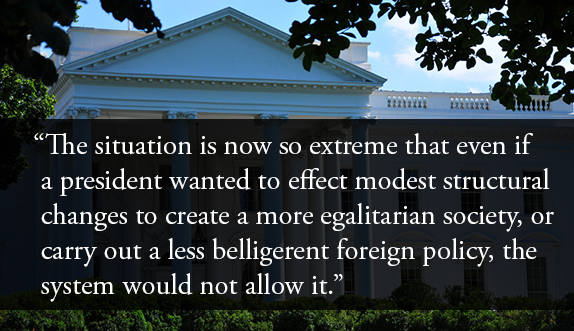
The first thing to recognize is that we cannot depend upon so-called leaders to guide us out of the wilderness that they and their predecessors, under the profound influence of this failing system, and with our passive consent, have constructed. Recall that the current President of the United States campaigned on a platform promising to rescue his country from financial catastrophe but immediately upon entering office appointed the same economic advisors, associated with his predecessor, instrumental in creating the original problem. This is not necessarily because presidents lack conscience and lie, though clearly the case, or because they lack intelligence, which is debatable, it is because given the overwhelmingly profound belief in the values of the prevailing system (not to mention the corrupting influence of power), there can hardly be a chance of any president ever opposing these forces or even questioning them. The situation is now so extreme that even if a president wanted to effect modest structural changes to create a more egalitarian society, or carry out a less belligerent foreign policy, the system would not allow it. There are too many opposing forces on the side of entrenched powerful interests to permit such a thing. We are held in check by institutional barriers that are impenetrable through ordinary means.
The power of US exceptionalism, the belief that the country has been anointed by destiny as a light to the world, together with the corporate media’s incessant repetition of this message (along with a million other daily absurdities), has created a populace seemingly bereft of imagination and critical intelligence. Compounding the problem is a decades-long assault on teachers and public education by these same corporate powers that has left what used to be one of the best public educational systems in the world in a state of seemingly terminal decline. As a consequence of these obstacles, we find ourselves hard-pressed to generate the requisite independence and energy of mind to understand the nature of the oppressive system under which we labor, much less throw it off. But this first step must be achieved if there is to be any chance at all. The question is how.
Here is where teachers of all kind assume their roles as leaders of a future world. It is important that we utilize the majority of our interactions, no matter the setting, as opportunities for teaching and learning. This means consciously to begin taking power from the system that is herding us towards oblivion—to begin assuming responsibility for our own future. The only way to effect the kinds of changes that are necessary is to start developing community-scale organizations. The first step in developing these sorts of organizations is to get to know one’s neighbor. If one’s neighbor is not of sympathetic mind then find a neighbor that is. Then find another one. Then another. Meanwhile, each neighbor finds his or her own small group of like-minded people. Then everyone gets together for dinner and has a conversation. From such beginnings larger things are possible.
The nature of these larger possibilities is the subject of conversations with one’s neighbors. The first step and critical element is the beginning of non-exploitative relationships with these same neighbors based on trust and sharing. As the nature of the system under which we labor is not conducive to trust and sharing, indeed, turns us in the very opposite direction, our focus must be consciously opposed to these harmful influences. A conversation focused on values of community and interdependence is one, which, followed to its natural conclusions, leads to action. This action begins with building local, social connections, such as community gardens, sharing of skills, transportation pools, festive gatherings, baby-sitting, tutoring, and care for the sick and aged. This is only the beginning. The goal is to reduce, and ultimately eliminate, our dependence on huge, impersonal government and corporate powers—to take control of our lives. On a larger scale this conversation necessarily includes free health care and education for all, forgiveness of education and medical debt, a 90% reduction in military spending, with the money saved going to a national economic program that includes a Manhattan-style program to convert to clean, renewable energy and a rebuilding of the nation’s infrastructure.
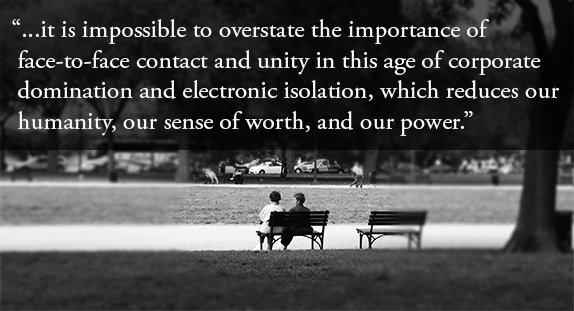
The conversations that begin with our neighbors will inevitably expand to a debate on the nature of these larger social and economic relations. Our ideals should be based on the principles of non-exploitative interdependence and peaceful resolution of conflict. Some form of non-dogmatic socialism, or mixed economy, adapted to fit a given society’s contours, would likely result from these conversations. In the US it might be a reversion to small businesses where modest profits are acceptable. Where large institutions are necessary all production and profit would be at the service of the community. The present system is one in which alien entities have invaded our lives, taken over our souls, drained us of nourishment, and ravaged our culture. In an alternative vision, money spent locally would go directly back into the community instead of into the distant bank accounts of Wal-Mart and Home Depot CEOs and shareholders. No more corporations. No more obscene wealth in the hands of a greedy few. Our dinosaurs, Bill Gates, the Koch brothers, Michael Bloomberg, Jeff Bezos, Warren Buffet, the Walton family, and all others of their inflated ilk can start building their museum now. Let them make it grand. When they die they can have their bodies stuffed and put on display for our grandchildren to gawk at.
Our goal being the transformation of society, it is impossible to overstate the importance of face-to-face contact and unity in this age of corporate domination and electronic isolation, which reduces our humanity, our sense of worth, and our power. This vampire system sucks us of will, imagination and independent thought, leaving us alone and unhappy, with unquenchable desires for meaningless things and irrational attachments to empty symbols and virtual worlds. Alone, we are at the mercy of these forces. Naturally, those who rule are content with this state of affairs and do everything they can to isolate us further and instill in us the fear of almost everything, thereby increasing our dependence on their authority.
Everywhere there is a yearning to escape the hell we have created for ourselves. A great, volcano-like energy roils below the surface, ready to explode. There is an inevitability about this, and enormous danger. The danger lies in the thoughtless eruption of this volcano, thereby giving the state the excuse it needs to murder and imprison us. About this there should be no illusions. Therefore we must be more intelligent than the state and hold ourselves to a high moral standard in our goals and actions. We must renounce violence, for it is violence that nurtures the state’s machinery. The state is the master of violence. The state begs us to resort to violence so it can respond in kind and crush us.
It is a virtual guarantee that even if we are non-violent the state will respond with vicious brutality. We saw it in Ferguson, Missouri. We saw it in the violent suppression of the Occupy movement. We see it everywhere. But if our greater goal is to finally conquer these self-destructive human behaviors and create a better future, then we must be resolute in following this ideal. This is something worth dying for. Again, we turn to Pascal. We cannot know if it is possible to evolve towards a more peaceful version of human nature unless we act as if it is. If we continue to act as if it is not, and do nothing, there is no hope.
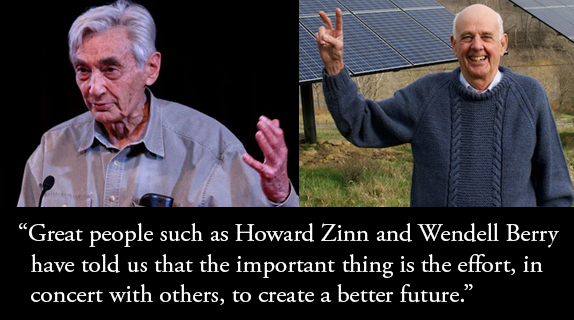
This corporate capitalist system is killing us. It is destroying our humanity, our children, our homes, our communities, and our planet. Corporate capitalism has no thought for anything but immediate profit, whatever the human and environmental cost. Its primary goal, and it has succeeded, has been to reduce human beings to consumers, greedily devouring the planet’s resources with no thought for future generations. In this regard we have become, each of us, small models of the corporation. We live to consume in the moment, never satisfied, addicted to temporary pleasures, driven to have more, advertising our self-worth with outward symbols that vainly attempt to conceal our emptiness.
Find your neighbors. Have dinner with them. Begin the conversation that might save our lives. We will not see victory, if such a thing is even possible, in our lifetime. But at least we will know that we are trying, and that we have made the bet. If nothing else you might make some new friends. Great people such as Howard Zinn and Wendell Berry have told us that the important thing is the effort, in concert with others, to create a better future. The process of trying to create a better future is enriching and gives profound value to one’s life. The biggest obstacle is not the state or the corporation, but our own deadly inertia. Prisoners of fear, silence and solitude, we are secretly convinced of the futility of interaction and community, of hope. We want to be alone, isolated in our private worlds. This is precisely the condition this evil system desires. It is time for something else. We can do it.
(Photos: Earth by NASA Goddard Space Flight Center; Fence weaving by NYC Dept. of Transportation; Rich/poor divide by David Blackwell; Friends talking by Vinoth Chandar; Whitehouse by Glyn Lowe; Howard Zinn by Gogonobo; Wendell Berry by Brtom1)




Responses to “Time for Something Else”